- Home
- Alice Hoffman
The World That We Knew Page 5
The World That We Knew Read online
Page 5
“You have many,” Hanni insisted. “You’ve just never met them. You’ll be visiting cousins who live in Paris.”
Hanni turned away so that her daughter wouldn’t see her eyes brimming with tears. It didn’t matter. Lea saw her mother as she was, fierce as always, but broken inside.
“Where will you be?” Lea asked.
“I’ll be here, taking care of Bobeshi.”
Bright tears burned in Lea’s eyes. “Then I will be, too.”
“No,” Hanni said. “You must honor your mother, as I honor mine. This is not a choice. You must do as I say.”
“You’ll send me away alone?”
“Of course not. You’ll be safe with Ava. She will follow you to the ends of the earth. And she’s stronger than a hundred horsemen. What you ask her to do, she will do without question.”
“I won’t go,” Lea cried. “You can’t make me.”
Without thinking Hanni slapped her daughter, the love of her life, the child she would have done anything for. Lea put a palm to her cheek, confused by her own feelings.
Hanni sank to her knees, reaching to take the girl’s face in her hands. “I need you to do as I say.”
Perhaps her mother blamed her for what had happened with the soldier and this was her punishment, to be sent away.
“When you travel you will no longer be yourself,” Hanni told her.
She would be Lillie Perrin, a Catholic accompanied by her cousin Ava. Jews were no longer issued visas or allowed to travel outside the country, and if asked she must remember an unfamiliar prayer to prove her identity.
Glory be to the Father, and to the Son, and to the Holy Spirit, as it was in the beginning, is now, and ever shall be, world without end. Amen.
That evening they shared the last pot of Hardship Soup. It was made only of cabbage and water, for there were no longer any spices. Ava lifted Bobeshi from bed and carried her so she could sit at the table, something she hadn’t been able to do for more than two years.
Bobeshi kissed Ava in gratitude. The kiss was sweet and pure. “She is the one,” Bobeshi declared.
“Why is she so strong?” Lea asked her mother.
“Because she needs to be,” Hanni told her daughter.
In the midst of the heartbreak of what was to be their last dinner, Hanni took out a small paper box. Inside was a gift she’d planned to give her daughter on her thirteenth birthday. Now she understood that they would not be together on that day.
Hanni had considered this gift carefully, ordering it before the Jewish jewelry stores had been closed down, forced to turn over their gold and silver to the government. The charm she’d had fashioned was a silver triangle marked with Lea’s birth date and three Jewish stars. On the back there was the mystical letter hey, the most mysterious symbol in the Hebrew alphabet, which in the ancient world could mean thread or window or fence or behold. It was made up of three lines to represent the three aspects of humanity: the physical world, the spoken word, and the soul. It was one of the names of God. It was protection, it was love, it was a secret, it was the beginning, it was the end.
Hanni clasped the necklace at her daughter’s throat. She must keep it hidden to ensure that no one noticed the Hebrew letter, but one day, when she was at last safe, when there were no more soldiers on the streets or murderers knocking at the doors, she must unlatch the necklace, open the charm, and do exactly as she was instructed.
“You cannot debate or make up your own mind. You must do what I’ve written. Do you understand me?”
Lea didn’t understand the way the soldier had touched her, or the demons in the trees, or why the dark-haired woman sat at their table. She didn’t understand why her mother would give her such a beautiful gift when Lea had caused Hanni to become a murderess. There was still blood on their shoes. Their visitor had taken it upon herself to clean them, wiping the leather with warm water, then using a stiff wire brush to get rid of the last of the stains.
“My dearest,” Hanni said. Mein Kind, mein Schatz. Heart of my heart, love of my life, the one loss I will never survive. “Make me this single promise and I will never ask you for anything else.”
“Yes,” Lea said. She had decided not to cry, but that didn’t mean she wasn’t broken inside. “I will do as you say.”
To say goodbye is a terrible thing, made even worse when you don’t know why you are being sent away.
“We can’t give up,” Bobeshi whispered as she hugged Lea. “We have to save the next generation so that one day you can rescue people, as your father did. We love you more than we love our own lives.”
Their embrace lasted a long time, long enough for Bobeshi to tell Lea the story of the last wolf in her village. It was the middle of winter, when the whole world was white, and a wolf and her cub had been chased as far as they could go. There was no escape, at least not for both. When the mother wolf ran to attack the hunters, all they saw were her claws and her fangs. While they shot her, the cub disappeared into the snow. That was the moment when its coat turned from black to white so that it was forever after invisible to hunters.
“That is the way a mother triumphs,” Bobeshi said. “All you have to do to is survive and your mother lives through you.”
Lea kissed her mother, nothing more. She did none of the things she wanted to do. She did not lock herself in the closet or throw the suitcase across the room.
“I will always love you,” her mother told her. “Wherever you are.”
Lea knew this was true, but Bobeshi had told her a harder truth. The wolf turned white in the snow. It managed to live, but it went on alone.
She was in the hallway with the stranger, her suitcase in hand. It was difficult to take a breath because something inside her chest was burning, but she went down the stairs and she didn’t look back.
Do not cry, do not weep, do not beg, do not demand, do not ask why, do not hold on to her waist, do not throw yourself upon the floor, or hide beneath the bed, or lock yourself in the closet, and spit out words you will regret. Pack your bag and kiss your mother and know what she has done, she has done for you. Kiss her again, that is fine, and tell her you will miss her, you can do that, too, and then turn around and walk out, even if you hear her crying, even if your heart is telling you not to go. Her triumph depends on this. Her triumph is you.
In the courtyard, Tante Ruth was collecting weeds to boil into a mixture even more bitter than Hardship Soup. The weeds were poisonous and she had been waiting for the right time to pick them. She was ready for the World to Come, and had already lived too long, so she had decided to take matters into her own hands. This was the day. She had the cooking pot on the stove and the water was boiling. When she saw Hanni’s daughter and the golem, she was grateful to have lived long enough to see a last miracle. The old woman’s gaze fell upon Ava with compassion, and with something that was as close as she could get to love on the last day of her life, when Azriel was waiting beside her bed with the book he always carried, at last opened to her name.
As they walked to the station, Ava reached for the suitcase; it was her duty to do such things, but Lea wouldn’t let go of it. She didn’t trust the stranger, and what was more, she didn’t trust herself. She had the scissors in her pocket. She remembered what it felt like to bite down on the soldier’s hand, and when she ran her tongue over her broken tooth she felt a chill. All she had witnessed in the past days had left something sharp inside of her. She kept one hand on the scissors in her coat pocket. She could feel the wind on the back of her neck.
“I should help you,” the golem said. “The suitcase is heavy.”
Lea didn’t answer. If she had to hate someone, it might as well be Ava. The hatred tasted sweet in her mouth. She rolled it over her tongue and her broken tooth.
Ava had been given directions to the Pulitzerstrasse Station, but she had no need of them. She instinctively knew which route would keep Lea safe. She saw the path they must take as a crow sees the earth, from a distance but with complete
accuracy. At the station, she kept one hand on the girl’s wrist as they made their way through the crowds. Lea’s pulse was racing.
“Let go of me,” she said.
She had been between girlhood and womanhood, looking forward to her thirteenth birthday. Now she was nothing, a changeling, half of each and nothing of either. Tall and awkward, someone who had been beautiful until she told herself that being beautiful was a crime. Now she was a pale, gawky girl. She did her best to pull away, but her mother had told her that Ava was strong and she was right. There was no possibility of eluding her grasp, not unless Lea wanted to reveal herself for the wolf that she was. That could wait until the time was right.
No Jews were allowed out at this hour, still the station was mayhem with so many Germans leaving the city. The crowds opened for Ava, perhaps because of the way her gaze settled onto people, as if she could see inside of them. Some wept when she drew near, some stopped speaking, some realized they had forgotten how to love. Some, like the girl she was with, were frightened of her for reasons they didn’t quite understand.
As they walked along the platform, Lea had a vision of her mother weeping behind the apartment door, and of Bobeshi, in her bed, blaming herself for splitting the family apart because she could not walk. It was possible that she would never see them again. A wave of panic set in. She didn’t think she could contain herself and keep going, pretending nothing was wrong. If she turned and ran right now, perhaps she could find her way home through the unfamiliar streets around the station.
“Don’t think about that.” Ava could read her thoughts now that they were linked together. One breathed in, the other breathed out, like it or not. “Everything your mother has done is to ensure your escape. We will do as she says.”
Lea glared at her companion. You are nothing to me and everything I care about is here. “You don’t know what I’m thinking,” she said in a bleak bitter voice.
“You’re thinking I am nothing to you.” Ava gave the girl a sidelong glance, finding herself pleased that she had been able to shock her. It was strange to have such a feeling when she was made to be clay.
“You’re not my cousin,” Lea said.
“If your mother says I am, it must be so.”
They stared at each other with cold eyes. Both must do as Hanni had instructed.
The conductor checked their tickets, then allowed them to board. Those who had not managed to get onto the train soon began to shout and strike their fists against the doors, but it did them no good. Soldiers were called in, and the riot was stopped as quickly as it had begun. The last people to board were the rabbi’s daughters. Marta’s dress was torn when a man grabbed for her ticket.
“Keep your ticket hidden,” Ettie told her. “Everyone wants to steal.”
The sisters had nearly missed the train. There had been so much to do before their departure. First they bought packets of hair dye to turn Marta’s dark hair blond so she would appear more Aryan. Both girls had rid themselves of their head scarves and cut their waist-length hair, which had never before been shorn. It was shoulder-length, with a fringe of bangs, so they might look like ordinary Germans. They had fled through the window above the sink, landing in a patch of their mother’s herbs. Now they both smelled like rosemary, the scent of remembrance.
They’d found themselves lost in the narrow cobbled streets near the station for more than an hour as they searched for the shuttered storefront where they were to purchase their visas. Before this night they’d barely been out of their house, and Berlin was a mystery. Despite Ettie’s harsh manner, she was innocent in the ways of the world, and now realized they had been taken in by a charlatan. Hanni had given her an address where they could buy their visas, but that man charged too much and instead they’d gone to what people called the Street of Forgers. In her haste she’d chosen an amateur, a painter from the art school who was new to the task and not terribly adept. Once she’d handed over the second emerald, Ettie had no choice but to go forward with his flawed work and hope for the best. They were now sisters called Karin and Margrit Beck, although it was difficult to make out the forger’s messy print. Marta’s fingers had turned blue from the running ink.
As the sisters approached their compartment, Ettie was dismayed to discover they would not be traveling alone. When they slid the door open, Marta gasped. “What is she doing here?”
“It’s not a problem,” Ettie assured her sister. “It’s safer this way.” Ettie seemed confident, but in truth she was nervous to come face-to-face with the golem, although quite amazed by how utterly human her creation appeared to be. Ettie’s first thought was that the monster might take the opportunity of their meeting to harm her, for it was well known that golems often destroyed their makers.
Ava had seen the girls through the glass and had immediately risen to her feet, her face rapt, her shining dark hair flowing down her back like a river. She fell to her knees in gratitude, for her maker was right in front of her, the giver of life, whom she’d believed she would never see again. Ava bowed her head, praying that Ettie would see fit to grant her the continuation of breath and life.
“Stand up!” Mortified, Ettie peered over her shoulder to make sure no one had noticed Ava’s behavior. “You mustn’t call attention to yourself,” she told the creature. “You’re a woman like any other.”
Lea watched this encounter with great interest. What would make Ava get on her knees to a girl not many years older than Lea herself was? Something was amiss, she knew that much. She had the shivery feeling she’d had right before the incident with the soldier. A warning bell inside her that told her this meeting was not what it seemed.
Ava did as she was told, but she took Ettie’s hand and kissed it before Ettie could pull away and throw the creature a dark, irritated look. They hadn’t thought to teach her what it meant to be a woman. Now, if they weren’t careful, she would give them all away. “That’s not necessary. Just sit down. Follow what everyone else does and don’t make a scene.”
“Of course.” Ava was learning human behavior by the minute, although as far as she could tell there was no logic involved.
Ettie glanced at Lea. “I assume this is the daughter.” When Ava nodded, Ettie said, “Make sure she behaves.”
Lea took an instant dislike to the red-haired girl, whose face was pale with anxiety despite her domineering manner. As for Ettie, she ignored Lea completely. All she could think about were the shoddy visas she and Marta carried. Marta, on the other hand, was more than ready to befriend Lea. There were only a few years between them, and Marta was so unworldly and childlike that she seemed younger than the angry twelve-year-old who shared their compartment. Ever since they’d left home, Marta had been crying on and off as she thought of how their mother would react when she discovered they had climbed out the kitchen window. It was a relief to talk to someone else who had left her home behind.
“We know your mother,” she told Lea.
Lea narrowed her eyes. What was this?
“We hardly know her at all,” Ettie interrupted. She wished she’d thought to tell Hanni to get them tickets in different compartments. There was no need for Lea to know the truth of her situation.
“You seem to know Ava.” Lea did her best to figure out what was being hidden from her. There was a secret, one that everyone, including her mother, had been privy to, except for her. “She certainly knows you.”
“She’s my maker,” Ava said simply.
Ettie gave the creature a scathing look. She hadn’t thought the golem would come to life as an idiot. “Stop talking,” she told Ava.
“Does she answer to you?” Lea asked Ettie. “Because she told me she answered to my mother and no one else.”
“We all answer to God, don’t we?” Ettie said.
It was a difficult statement to dispute. Ettie was tricky that way. She knew how to answer a question with a question. Still, Lea knew something was amiss. When the train began to move, she took hold of her suitcase. She shoul
d not be here. She should be with her mother. They’d held hands, they’d run with blood on their shoes, they’d slept in the same bed when there were thunderstorms, they’d celebrated Passover with a single apple and no matzoh, reading from a Haggadah, though to own such a book was a crime. Everything was a crime in their world, but she must return to where she belonged. If her mother and Bobeshi were arrested, she would go with them. She could save them; she knew that she could if only she had the chance. The train was still going slowly. It had to be now. Lea could leap onto the platform and then find her way home. She stood up, suitcase in hand, but the train was moving faster than she’d initially thought, and she stumbled. Ava reached out to stop her fall.
“We must do as we’re told,” Ava reminded her. “We will honor your mother and follow her instructions.”
“Because she is your maker?” Lea asked, her heart breaking.
Ava shook her head. “Because she is yours.”
Once they had left the outskirts of the city, Ava gazed out the window. She could see the world beyond men’s eyes. There were angels in the canopy of the trees that lined the train tracks. Melahel, angel of safe travel and healing. Haiel, angel of courage. Ornael, the angel of patience who guards against sorrow. Each time someone was born, three angels were sent to watch over her for a lifetime, and these angels were Lea’s. Seventy-two angels guided humanity, but men and women couldn’t see them and, on those rare occasions when the angels spoke, they couldn’t hear. But Ava observed their world as easily as she did the world of human beings. She spied Azriel, the angel that could be seen by human eyes in the final instants of a life. He was following the train, for his work was never done. He came to peer in their window, and Ava held Lea’s hand. She wasn’t about to let him come anywhere near Hanni’s daughter.
Lea pulled away. “I won’t run,” she said.
At least not yet, not until she was ready, not until she had a plan. She looked out the window, but all she saw was her own reflection in the glass. Lea was someone completely different than the person she’d been before her grandmother told her to pack up her suitcase. She was the tall, resentful girl who’d once had a mother and a grandmother and a father, who went to school and was the best student in her class, who always followed rules, who had never been kissed, not a real kiss, not one she wanted, who did as she was told, who had no idea there were angels above them.

 The Story Sisters
The Story Sisters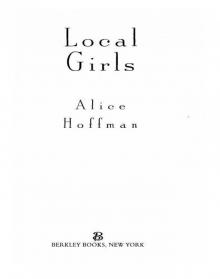 Local Girls
Local Girls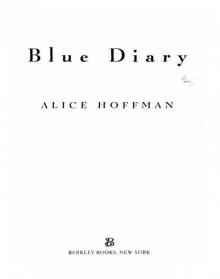 Blue Diary
Blue Diary The River King
The River King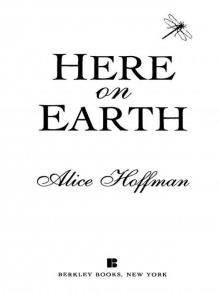 Here on Earth
Here on Earth Illumination Night: A Novel
Illumination Night: A Novel The Marriage of Opposites
The Marriage of Opposites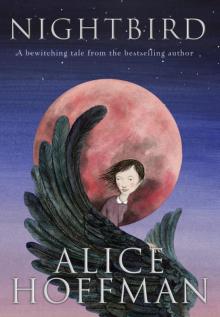 Nightbird
Nightbird Incantation
Incantation Skylight Confessions
Skylight Confessions The Ice Queen
The Ice Queen Second Nature
Second Nature Fortune's Daughter: A Novel
Fortune's Daughter: A Novel Seventh Heaven
Seventh Heaven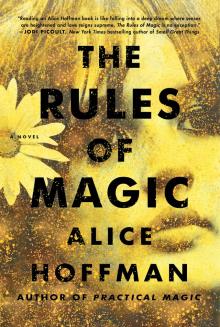 The Rules of Magic
The Rules of Magic The Red Garden
The Red Garden The Third Angel
The Third Angel White Horses
White Horses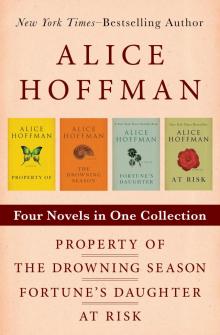 Property of / the Drowning Season / Fortune's Daughter / at Risk
Property of / the Drowning Season / Fortune's Daughter / at Risk Angel Landing
Angel Landing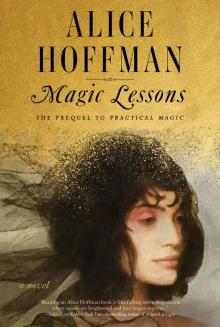 Magic Lessons
Magic Lessons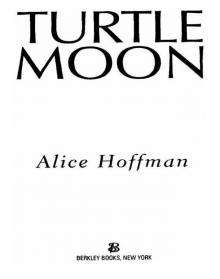 Turtle Moon
Turtle Moon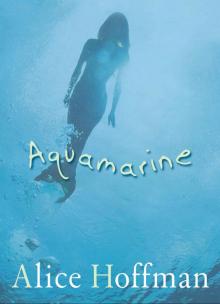 Aquamarine
Aquamarine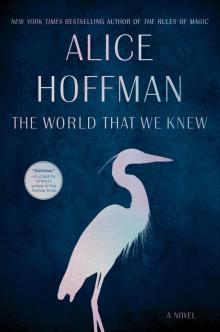 The World That We Knew
The World That We Knew Faithful
Faithful The Dovekeepers
The Dovekeepers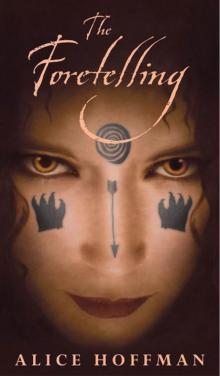 The Foretelling
The Foretelling Green Angel
Green Angel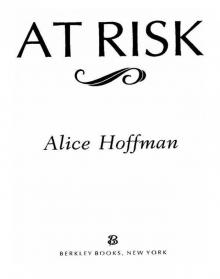 At Risk
At Risk Green Heart
Green Heart Fortune's Daughter
Fortune's Daughter Faerie Knitting
Faerie Knitting Incantation (v5)
Incantation (v5) Green Witch
Green Witch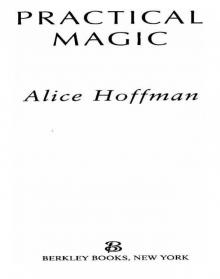 Practical Magic
Practical Magic The Museum of Extraordinary Things
The Museum of Extraordinary Things The Probable Future
The Probable Future Illumination Night
Illumination Night The Dovekeepers: A Novel
The Dovekeepers: A Novel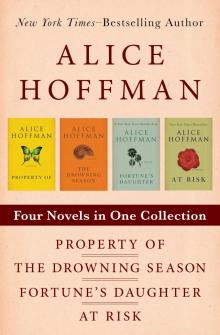 Property Of, the Drowning Season, Fortune's Daughter, and At Risk
Property Of, the Drowning Season, Fortune's Daughter, and At Risk